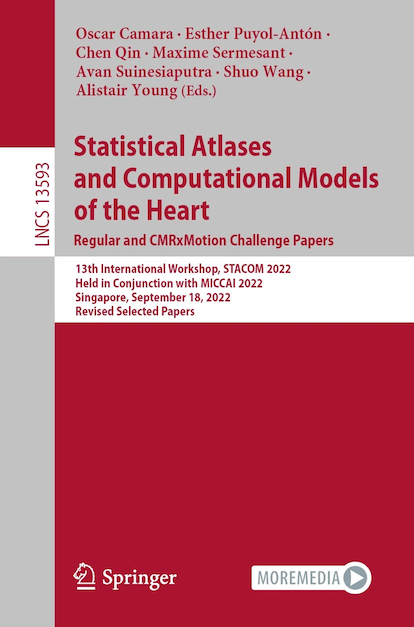Program
| 8:00-8:15 | Welcome |
| 8:15-9:30 | Regular papers I |
| 8:15-8:30 | Interpretable Prediction of Post-Infarct Ventricular Arrhythmia using Graph Convolutional Network Buntheng LY, Sonny Finsterbach, Marta Nuñez-Garcia, Pierre Jais, Damien Garreau, Hubert Cochet, Maxime Sermesant |
|
| 8:30-8:45 | Sensitivity analysis of left atrial wall modeling approaches and inlet/outlet boundary conditions in fluid simulations to predict thrombus formation Carlos Albors Lucas, Jordi Mill, Henrik Kjeldsberg, David Vilades, Andy Luis Olivares, Kristian Valen-Sendstad, Oscar Camara |
|
| 8:45-9:00 | Deep Computational Model for the Inference of Ventricular Activation Properties Lei Li, Julia Camps, Abhirup Banerjee, Marcel Beetz, Blanca Rodriguez, Vicente Grau |
|
| 9:00-9:15 | Learning correspondences of cardiac motion using biomechanics-informed modeling Xiaoran Zhang, Chenyu You, Shawn Ahn, Juntang Zhuang, Lawrence Staib, James Duncan |
|
| 9:15-9:30 | Spatiotemporal Cardiac Statistical Shape Modeling: A Data-Driven Approach Jadie Adams, Shireen Elhabian, Alan Morris, Nawazish Khan |
| 9:30-9:40 | Coffee break |
Keynote speaker: Liang Zhong
INITIATE project - integrated computational modeling of right heart mechanics and blood flow dynamics in congenital heart disease
| 9:40-10:40 |  Liang Zhong is an Associate Professor at National Heart Centre Singapore and Duke National University of Singapore. He is heading Cardiovascular Engineering and Technologies Theme and co leading Cardiovascular System AI Lab. His research focuses on cardiovascular imaging, computational modeling, cardiovascular mechanics and physiology, and application of artificial intelligence in medicine. He has developed methods for quantification of heart shape, myocardial velocity and strain, and function using MRI feature tracking and 4D flow MRI. He is Principal Investigator for 1) INITIATE project to identify the most useful imaging and circulating biomarkers and exercise testing to guide management of paediatric and adult congenital heart disease [ClinicalTrials: NCT03217240]; 2) APOLLO programme. A 5000 cohort of Singaporean will be established for the study of coronary calcium score, epicardial adipose tissue, stenosis, and plaque using AI algorithm and cardiovascular outcome. His work has been supported by National Research Foundation, National Medical Research Council, Biomedical Research Council, A*STAR, and SingHealth Foundation. He has published over 180 peer-reviewed papers and filed 10 patents. Liang Zhong is an Associate Professor at National Heart Centre Singapore and Duke National University of Singapore. He is heading Cardiovascular Engineering and Technologies Theme and co leading Cardiovascular System AI Lab. His research focuses on cardiovascular imaging, computational modeling, cardiovascular mechanics and physiology, and application of artificial intelligence in medicine. He has developed methods for quantification of heart shape, myocardial velocity and strain, and function using MRI feature tracking and 4D flow MRI. He is Principal Investigator for 1) INITIATE project to identify the most useful imaging and circulating biomarkers and exercise testing to guide management of paediatric and adult congenital heart disease [ClinicalTrials: NCT03217240]; 2) APOLLO programme. A 5000 cohort of Singaporean will be established for the study of coronary calcium score, epicardial adipose tissue, stenosis, and plaque using AI algorithm and cardiovascular outcome. His work has been supported by National Research Foundation, National Medical Research Council, Biomedical Research Council, A*STAR, and SingHealth Foundation. He has published over 180 peer-reviewed papers and filed 10 patents. |
| 10:40-12:10 | LAScarQS Challenge Left Atrial and Scar Quantification & Segmentation |
| 12:10-13:30 | Lunch & poster Click here to see all the posters |
| 13:30-15:00 | CMRxMotion Challenge Extreme Cardiac MRI Analysis Challenge under Respiratory Motion |
| 15:00-15:30 | Coffee break |
| 15:30-16:45 | Regular papers II |
| 15:30-15:45 | Unsupervised Echocardiography Registration through Patch-based MLPs and Transformers Zihao Wang, Yingyu Yang, Maxime Sermesant, Hervé Delingette |
|
| 15:45-16:00 | 3D Mitral Valve Surface Reconstruction from 3D TEE via Graph Neural Networks Matthias Ivantsits, Boris Pfahringer, Markus Huellebrand, Lars Walczak, Lennart Tautz, Olena Nemchyna, Serdar Akansel, Jörg Kempfert, Simon Sündermann, Anja Hennemuth |
|
| 16:00-16:15 | Efficient MRI Reconstruction with Reinforcement Learning for Automatic Acquisition Stopping Ruru Xu, Ilkay Oksuz |
|
| 16:15-16:30 | Physics-based deep learning framework to learn and forecast cardiac electrophysiology dynamics Victoriya Kashtanova, Mihaela Pop, Ibrahim Ayed, Patrick Gallinari, Maxime Sermesant |
|
| 16:30-16:45 | Post-Infarction Risk Prediction with Mesh Classification Networks Marcel Beetz, Jorge Corral Acero, Abhirup Banerjee, Ingo Eitel, Ernesto Zacur, Torben Lange, Thomas Stiermaier, Ruben Evertz, Sören Backhaus, Holger Thiele, Alfonso Bueno-Orovio, Pablo Lamata, Andreas Schuster, Vicente Grau |
| 16:45-17:00 | Prizes and closing |

